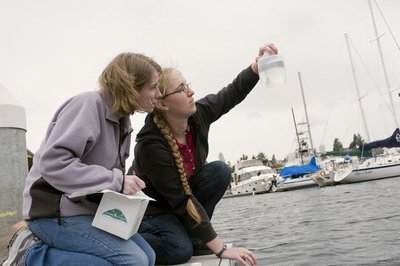December 4, 2008
Spicy Puget Sound: Fish swim in ‘big, dilute latte,’ research shows
‘Tis the season and the waters of Puget Sound are “flush” with holiday spices and flavorings.
Individuals and water managers alike are concerned about the antibiotics, painkillers, hormones and other substances that are swallowed, pass through us and become part of the treated sewage water that flows into Puget Sound. Measuring flavorings is a benign way of learning how substances may circulate, concentrate or dissipate in the Sound.
The sampling also emphasizes just how connected our actions are to Puget Sound, according to Rick Keil, a UW associate professor of oceanography. It’s a message worth reinforcing following yesterday’s unveiling of Puget Sound Partnership’s action agenda for improving the health of the Sound.
Sampling by UW researchers and students around Thanksgiving got a boost this year. In order to enlist the help of citizen scientists, the UW launched a new organization called SoundCitizen in mid-November.
SoundCitizen distributed 215 water-sampling kits to people all around Puget Sound. Volunteers with kits bearing even numbered barcodes were asked to sample streams or the Sound before Thanksgiving. Those having odd numbered barcodes were asked to sample after.
“The SoundCitizen program is totally driven by oceanography undergrads and former students,” Keil says. “Brittany Kimball, who graduated in June, is overseeing the day-to-day activity. We have five undergraduates in our aquatic organic chemistry lab working on this. An oceanography grad from 2006, Jaqui Neibauer, is the lab manager.”
In addition to the environmental-spices work, the lab also investigates pollutants that make their way into waterways.
The SoundCitizen program builds on two years of UW efforts sampling at the West Point sewage treatment plant in Seattle — checking what is released into the Sound — as well as sampling waters from Puget Sound and streams.
At West Point researchers have detected holiday spice-spikes of such things as cinnamon, vanilla and allspice, as well as increases in the herbs thyme and rosemary, starting immediately after Thanksgiving and lasting through the New Year. If one converts the amount of baking spices added to Puget Sound each day into the amount of spice that’s needed to make chocolate chip, gingerbread and snickerdoodle cookies, it translates into Puget Sound residents eating about 250,000 cookies per day during the holidays. That means the average person in Seattle is eating at least two cookies a day.
Of what’s been measured, the most abundant spice in Puget Sound year round is artificial vanilla, or ethyl vanilla.
“It has a much stronger taste than vanilla,” Keil says. “It’s used both as a flavoring and as a way to cover up things that taste bitter. It’s in aspirin, it’s in almost all vitamins, it’s in almost anything we consume, either covering up a taste or flavoring it.”
Other substances being tracked include ones found in waffle cones — which spikes in the summer — Kettle Korn and chocolate. The researchers also sample for caffeine, an indicator of how much coffee we’re drinking.
In considering how the natural world notices what we eat and drink, Keil asked fisheries experts what salmon might be able to detect.
“There are hundreds and hundreds of compounds that fish can smell,” Keil says. “And these spices are at concentrations that fish can smell. We don’t know if they care or not about swimming around in a big, dilute latte.”
Along with the environmental spices program, the new SoundCitizen effort offers opportunities for people who’d like to help find out what’s in rain water coming out of their roof gutters or about to go into city street drains. Volunteers are welcome to choose what they want to sample, according to the Web site at http://www.soundcitizen.org. That’s also where volunteers will find the data they’ve helped to collect and perhaps propose additional questions for research. To reach SoundCitizen, call Kimball at 206-221-6747 or brittanykimball@soundcitizen.org.



